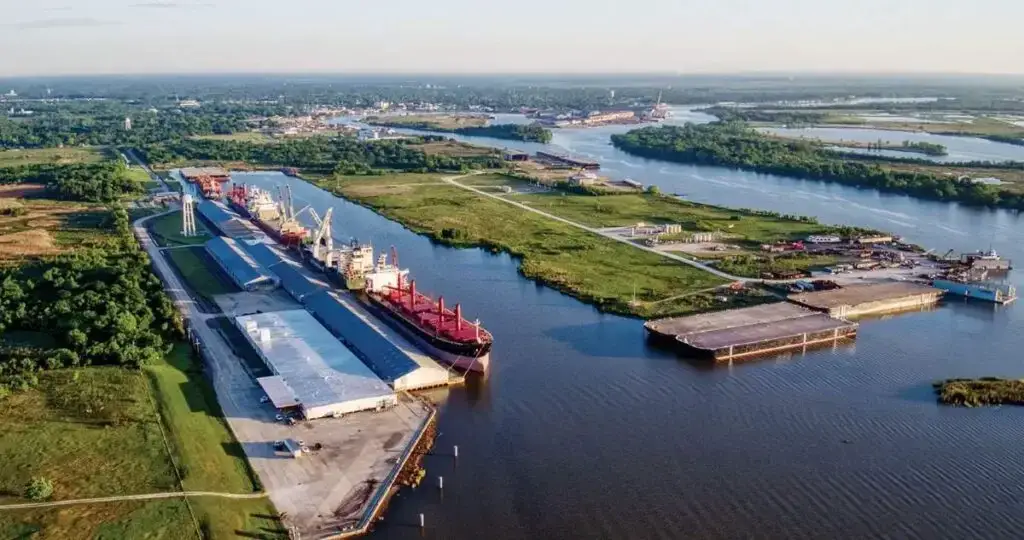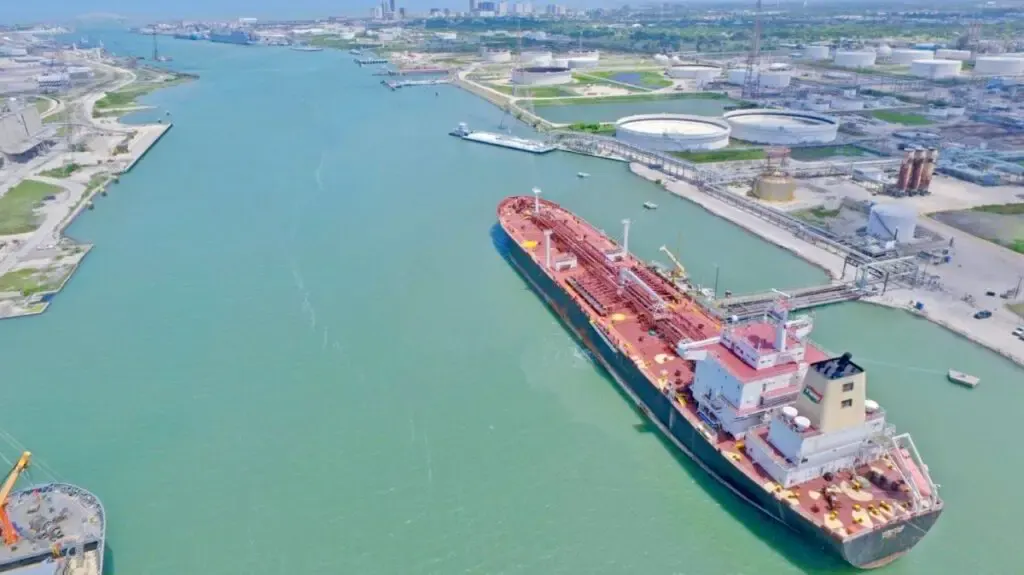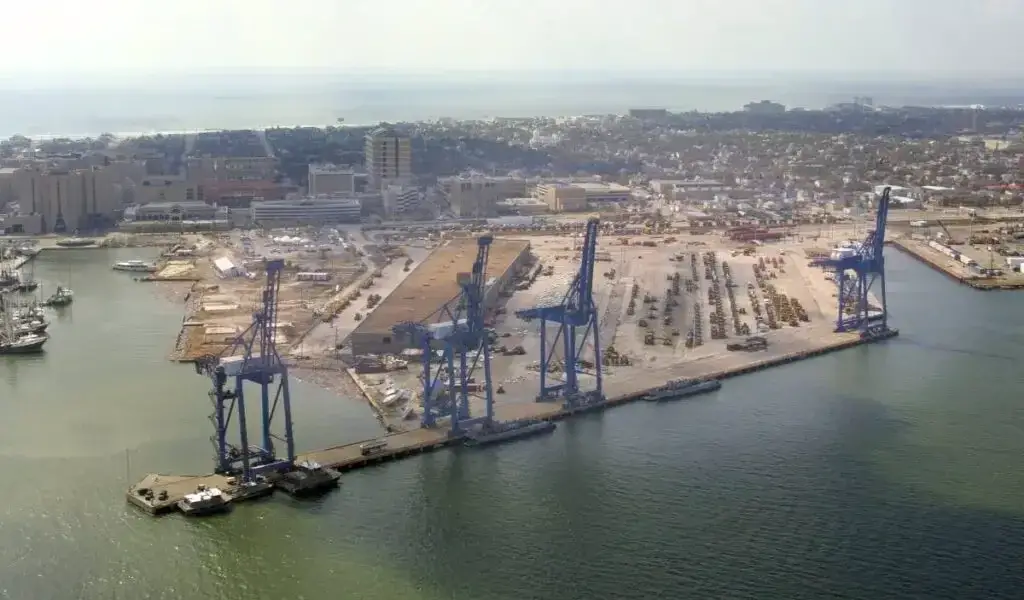To begin with, in the realm of international trade and commerce, Texas container ports stand as dynamic gateways, facilitating the flow of goods and propelling economic growth. Nestled along the Gulf Coast, these ports play a vital role in connecting industries worldwide.
Part A: Overview of Texas Container Ports in the Gulf Coast
Texan container ports, like Houston, Galveston, and Corpus Christi, encompass an extensive network of maritime terminals and infrastructure.
These ports boast cutting-edge technology, efficient operations, and ample capacity to accommodate the modern demands of global trade.
With strategic locations, they provide unparalleled accessibility to key markets, both domestically and internationally.
Part B: The Importance of Texas Container Ports in International Trade and Commerce
As bustling hubs of international trade, Texas container ports contribute substantially to the state’s economic success.
Without a doubt, expanding beyond the local level, they act as pivotal connections for global supply chains. Serving as primary gateways for shipping containers, these ports handle a vast array of commodities, from raw materials to finished products, creating countless opportunities for businesses to thrive.
Table of Contents
Overview of Major Texas Container Ports
A. Port of Houston

To point out, the Port of Houston is one of the largest and busiest ports in Texas. It plays a significant role as a major hub for container shipping in the state. With its strategic location, it provides easy access for cargo traffic and serves as a vital gateway to the Gulf of Mexico.
B. Port of Beaumont

Located on the Neches River, the Port of Beaumont is an important port in Texas, contributing to trade activities in the region. Its location allows for efficient goods transportation and serves as a key entry point for various cargos, making it a crucial driver of the regional economy.
C. Port of Corpus Christi

The Port of Corpus Christi is situated on Corpus Christi Bay, making it an ideal location for handling containerized cargo, imports, and exports. It serves as a vital link in international trade and contributes significantly to the economic development of Texas.
Read More on Ultimate Guide To Best Container Home Builders In Texas
D. Port of Galveston

The Port of Galveston is not only a popular container port but also a renowned cruise port. Its significance in the Gulf Coast region is immense, as it plays a crucial role in facilitating trade activities and promoting economic growth.
E. Port of Freeport

Located on the Gulf Intracoastal Waterway, the Port of Freeport serves as a vital link for international trade and provides global market access for various industries.
Its strategic location positions it as a crucial player in the movement of goods and plays a key role in supporting economic growth.
Read More on Container Garage for Motorcycle – Reliable Storage Solutions
Container Shipping and Logistics
A. Overview of container shipping in Texas
Without reservation, container shipping plays a crucial role in the transportation of goods through Texas container ports, ensuring efficient and secure movement of cargo across international borders.
As one of the largest states in the US, Texas boasts several major container ports that serve as gateways for global trade.
1. Definition and importance of container shipping
Container shipping involves the transportation of cargo in standardized containers, allowing for easy handling and transfer between different modes of transport such as ships, trucks, and trains.
This method of shipping revolutionized the industry by increasing efficiency, reducing costs, and minimizing the risk of damage to goods.
Container shipping is of paramount importance to Texas container ports as it enables the state to connect with markets worldwide, facilitating the import and export of various commodities.
It has become the backbone of international trade, enabling the smooth flow of goods across borders.
2. Standardized container transportation on ships
Shipping containers come in standard sizes and are designed to be transported on specialized container ships. These giant vessels are specifically built to accommodate large volumes of containers, ensuring their safe and efficient journey across the seas.
Modern container ships are equipped with advanced technologies, including crane systems, that allow for seamless loading and unloading of containers at Texas container ports.
This standardized method of transportation has revolutionized the shipping industry, making it faster, more reliable, and cost-effective.
- 35 pints of water removal per day.
- Perfect for large-sized rooms and basements up to 2000 sq. ft.
- Washable filter removes airborne particles and allergens.
- Custom Humidity Control sets the desired humidity levels for comfortable living environment.
- Automatically shut off when the tank is full.
- Effortless Humidistat for comfortable living environment.
- Easy-access design for quick filter change.
Read More on Florida Container Ports – Colossal Source of Used Containers
B. Logistics and Supply Chain Processes Associated with Texas Container Ports
Efficient logistics and supply chain processes play a critical role in the smooth operation of Texas container ports, ensuring the timely handling and delivery of cargo.
1. Role of logistics and supply chain in smooth cargo handling
Logistics and supply chain management involve the planning, coordination, and execution of various activities, including transportation, inventory management, and warehousing.
By effectively managing these processes, Texas container ports ensure the smooth movement of containers from the moment they arrive at the port to their final destination.
The seamless coordination of logistics and supply chain operations at Texas container ports minimizes delays, mitigates risks, and enhances customer satisfaction. This, in turn, attracts more businesses to utilize these ports for their shipping needs.
2. Importance of efficient transportation and delivery systems
Efficient transportation and delivery systems are crucial to the success of Texas container ports. These ports rely on a well-connected network of roads, railways, and distribution centers to ensure timely delivery of containers to their intended destinations.
By investing in state-of-the-art infrastructure and optimizing transportation routes, Texas container ports enhance their competitiveness and attract more shipping traffic.
The availability of efficient transportation and delivery systems enables businesses to access global markets more effectively and efficiently.
Read More on How To Put A Garage Door In A Shipping Container: Detailed Guide
Economic Impact of Texas Container Ports
Texas container ports play a crucial role in driving economic growth and prosperity in the state. Their contribution to the Texas economy can be seen in multiple aspects.
A. Contribution to the Texas economy
1. Job creation and employment opportunities
The presence of container ports in Texas creates a significant number of jobs and employment opportunities for the local population.
Port operations require a diverse range of skilled and unskilled workers, from dockworkers and truck drivers to logistics professionals and administrators.
These jobs not only provide individuals with stable incomes but also support the growth of related industries and businesses.
2. Investments attracted to the state
Container ports act as magnets for investments, attracting both domestic and foreign businesses to establish their operations in Texas.
The availability of efficient and well-connected port infrastructure makes Texas an attractive destination for businesses involved in international trade and commerce.
These investments not only boost the local economy but also strengthen the state’s position as a global hub for trade.
Read More on Luxury Container Homes In Australia – Experience Stylish Living
B. Role in International Trade and Commerce
1. Facilitating movement of goods between the United States and global destinations
Texas container ports serve as vital gateways for the movement of goods between the United States and various global destinations.
With their strategic location and efficient operations, these ports enable seamless trade connections, facilitating the import and export of a wide range of products.
This smooth movement of goods contributes to the growth of international trade and strengthens business relationships between Texas and other countries.
2. Impact on trade balance and economic growth
The presence of thriving container ports in Texas positively impacts the state’s trade balance and overall economic growth.
By enabling the export of locally produced goods and facilitating the import of essential commodities and raw materials, these ports contribute to the diversification and expansion of the state’s economy.
The revenue generated from trade activities helps fund public services, infrastructure development, and various economic initiatives that benefit both the state and its residents.
Read More on Luxury Container Homes in Florida – Unmatched Experience
Infrastructure and Expansion Plans
A. Infrastructure Development at Texas Container Ports
As the demand for container shipping continues to grow, the Texas container ports have been making constant efforts to enhance their capacity and efficiency.
These ports understand the importance of staying ahead of the game to accommodate the increasing volume of trade.
1. Constant efforts to enhance capacity and efficiency
- The Texas container ports have been investing in infrastructure development to ensure they can handle larger volumes of cargo efficiently.
- Continuous improvements in port facilities, including state-of-the-art equipment and technologies, have been implemented to support smooth operations.
- Efficiency-driven initiatives, such as upgrading port processes and streamlining logistics operations, have been undertaken to reduce waiting times and increase throughput.
2. Upgrades and advancements in port facilities
- Expansion and modernization projects have been underway to accommodate larger container vessels and improve cargo handling capabilities.
- The addition of new berths and deepening of existing channels have been planned to attract big container carriers and accommodate their increasing size.
- Investments in advanced cargo handling equipment, such as cranes and automated systems, have been made to ensure swift loading and unloading of containers.
Read More on Container Home Builders in Michigan – Discover The Best
B. Expansion Plans of Texas Container Ports
- Recognizing the need to accommodate the growing trade demands, the Texas container ports have developed comprehensive expansion strategies.
- These strategies focus on maximizing the ports’ capacity, improving infrastructure, and enhancing connectivity to other transportation networks.
1. Strategies to accommodate growing trade demands
- The ports have been actively working with government agencies and private stakeholders to identify and address potential bottlenecks in the supply chain.
- Efforts to optimize port operations, including improving intermodal connectivity and strengthening regional logistics networks, are being prioritized.
- Collaboration with shipping lines and freight forwarders is being sought to facilitate seamless end-to-end logistics solutions.
2. Planned developments and future projects
- Long-term expansion plans include the development of additional terminals and container yards to accommodate future cargo growth.
- Investments in advanced technologies, such as blockchain and IoT, are being considered to enhance supply chain visibility and operational efficiency.
- Environmental sustainability is also a key focus, with plans for eco-friendly initiatives, including the use of green energy sources and reducing carbon footprints.
Read More on Shipping Container Foundation Requirements: Build A Solid Base
Wharves, Ships, and Cargo Handling
A. Wharves and Their Role in Texas Container Ports
Wharves play a crucial role in the functioning of Texas container ports. These structures serve as docking areas for ships where containers can be loaded and unloaded.
Wharves provide the necessary infrastructure, including berths and equipment, to facilitate the smooth movement of cargo.
With multiple wharves strategically located along the Texas coast, container ports can efficiently handle a large volume of imports and exports.
B. Overview of Ships Used for Container Transportation
Container transportation heavily relies on specialized ships known as container vessels. These vessels are specifically designed to carry containers of various sizes and shapes.
Equipped with onboard cranes and special handling equipment, container ships enable efficient loading, unloading, and stacking of containers.
With their large carrying capacity, these ships play a pivotal role in the efficient operation of Texas container ports, facilitating the movement of goods across the globe.
C. Importance of Efficient Cargo Handling Processes
Efficient cargo handling processes form the backbone of Texas container ports. With a continuous flow of goods being transported through these ports, it is essential to ensure smooth and timely handling of cargo.
This involves efficient coordination between various stakeholders, including shipping lines, port authorities, and terminal operators.
By streamlining cargo handling operations, Texas container ports can reduce transit times, lower costs, and enhance overall customer satisfaction.
Read More on The Incredible History Of Shipping Containers That Will Amaze You
Information and Resources for Businesses
If your business is interested in expanding its operations to the container trade industry in Texas, there are several key pieces of information and resources that can help you make informed decisions and navigate the process smoothly.
A. Relevant Information for Businesses Interested in Texas Container Ports
- Understanding the import and export volumes of different Texas container ports can help you identify the most suitable location for your business.
- Next, familiarize yourself with the specific regulations and requirements related to customs, inspections, and documentation involved in container shipping.
- Thirdly, stay updated on any tariff changes or trade policies that may impact the container trade industry in Texas.
- Research the freight forwarding companies and shipping lines operating in Texas to find potential partners or service providers for your business.
- Finally, consider the availability and costs of warehousing and distribution centers near the ports to optimize your supply chain logistics.
Read More on Cost To Build A Container Home In Texas: Expert Analysis
B. Resources Available for Companies Looking to Operate in the Container Trade Industry
- To explain, the Texas Port Bureau offers comprehensive information and assistance for companies looking to enter the container trade industry in Texas. They provide access to market research, industry insights, and networking opportunities.
- The Texas Department of Transportation offers resources and guidance on transportation infrastructure, permitting, and regulations relevant to container ports in the state.
- Local economic development organizations and chambers of commerce can provide information on business incentives, workforce development programs, and networking events.
- Trade associations such as the Container Freight Station Association and the Texas International Freight Forwarders Association can provide valuable industry-specific resources and networking opportunities.
- Finally, consider hiring a customs broker or freight forwarder who specializes in container shipping to ensure compliance with customs regulations and streamline your operations.
Read More on Why Container Shortage Compromise Global Logistics And Trade
Conclusion
Texas container ports are vital assets that play a crucial role in the state’s economy, international trade, and logistics processes.
Throughout this comprehensive piece of content, we have explored various aspects of these ports, highlighting their significance and impact.
Recapping the key points, Texas container ports serve as gateways for global trade, facilitating the transportation and handling of containers.
They are strategically located along the Gulf Coast, offering access to major shipping routes and connections to various markets worldwide.
In terms of economic impact, these ports generate significant revenue, create job opportunities, and stimulate growth in related industries.
They contribute to the Texas economy by attracting investments, supporting local businesses, and fostering international trade partnerships.
The infrastructure of Texas container ports is continually evolving, with expansion plans in place to meet growing demands.
These ports are equipped with state-of-the-art facilities, advanced technology, and efficient cargo handling systems.
Such advancements ensure seamless operations and enhance the competitiveness of the ports in the global maritime industry.
For businesses involved in container shipping and logistics, the information and resources provided by these ports are invaluable.
They offer a wide range of services, including import/export assistance, logistics support, customs clearance, and warehousing facilities. The ports act as reliable partners, offering guidance and expertise to businesses throughout the entire supply chain.
In conclusion, Texas container ports serve as vital gateways for international trade, boosting the economy and providing crucial logistical support.
Their significance cannot be overstated, as they connect Texas to the world and facilitate the flow of goods and cargo.
With continuous advancements and a commitment to growth, these ports will undoubtedly continue to play a pivotal role in the global maritime trade landscape.
Read More on 10 Unknown Facts About Shipping Containers – Expert Review


